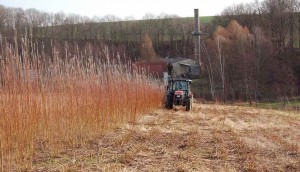
source: rokwood.eu
Thanks to a unique set of attributes, short rotation plantations (SRPs) are considered as one of the most sustainable and environmental friendly way to satisfy the woody biomass demand and the CO2 emissions reduction targets in the EU-28. In addition to their contribution to emission savings, short rotation plantations can play a key role in biodiversity protection, hosting a large number of invertebrate species. Dedicated plantations are also used as a soil erosion prevention method, as a defence against floods and as windbreak barriers.
Short rotation plantations can also be a very efficient land-use method, allowing the re-use of pre-treated sludge and wastewaters from municipal water treatment plants. Moreover, in a fluctuating energy market, SRPs have the advantage of being a stable energy option in both in a short term, thanks to the easy storage of wood chips- as well in a long term scenario – being a renewable energy source. A smart SRP business can ensure remarkable benefits to local economies: economy stimulation and job creation for low skilled workers are quite hot topics nowadays while the agricultural sector is constantly looking for new opportunities and crops. Shot rotation plantations can be part of the solution to these challenges: they can give farmers a chance to diversify their income, whilst reducing the demand for fertilizers thus also saving costs on the long term.
Despite these advantages, several barriers still prevent the deployment of the potential of SRPs in terms of environmental, economic and social benefits. In order to contribute in removing these barriers, the ROKWOOD project was launched i 2012 and co-funded by the FP7 “Regions of Knowledge” programme, with the aim of promoting SRPs as a sustainable method to produce woody biomass.
Among the many activities carried out so far by the project, 6 research driven regional clusters performed a “Strengths, Weaknesses, Opportunities and Threats” (SWOT) analysis in order to identify the most critical issues. Based on these findings a Joint Action Plan was developed aimed at increasing research, technology development and investments in sustainable woody biomass production and new utilisation schemes. Project partners are also currently engaged in developing pilot projects and regional SRP clusters, lobbying at an EU task group level, identifying multi-function/added value research areas, developing regional species guidelines, facilitating knowledge transference and setting up education and training programs for sector stakeholders.
A project event “Short rotation plantations, a winning strategy for sustainable production and efficient use of woody biomass” will be organized on 3 June in the framework of the 23rd EUBCE in Vienna. The most promising market opportunities and the core sustainability aspects of SRPs will be illustrated by relevant stakeholders representing public authorities, business and research entities. Participants will be invited to take part in the debate, sharing their point of view and comparing different experiences related to the development, implementation, monitoring and utilisation of SRPs for the production of woody biomass on local scale.
ROKWOOD is expected to create business opportunities for SMEs, SME Associations and RTDs. This means opening up new markets for renewable energy wood as well as to ensure a free market development in selected bioenergy regions.
Discover more about short rotation plantations in these videos made by Rokwood.
This post was written by Valeria Magnolfi, project manager European Biomass Industry Association, Brussels.


